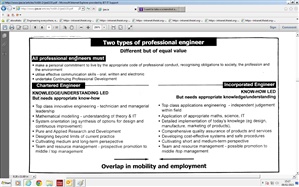Afternoon all, just sitting behind a laptop screen pondering and found myself plotting course for my career progression and seemingly unlikely professional registration for CEng.
My current employer has encouraged that I achieve CEng registration (easier said than done) and any promotion to the next grade would be subject to attaining CEng. I'm wary of submitting my application for CEng due to not having an adequate level of education (I have a Bachelors degree only) and at my age there's little chance of me returning to university for further study. I'm employed as a senior engineer and acting principal engineer within a project I'm currently commissioned. I appreciate that working at a principal engineer level does not necessarily provide the evidence required to prove that my understanding and knowledge is at a MEng level.
Rewind a few years, I was reasonably proud of successful registration and to achieve IEng, however, to date I'm of the opinion that it has done little else other than measurement / benchmark of my competence and identify area's in which I need to strengthen. My employer (at the time of registration) did not professionally recognise IEng registration and from my own observations nor do other employers (that I've noticed). A cursory glance of job listings on LinkedIn, shall normally state a requirement for applicants to hold CEng registration or working towards CEng with no mention of IEng. There's an immense pressure to achieve Chartership and with failure to do so could be possibly observed as I'm either inadequate or not quite cutting the grade by a prospective or current employer.
Is there any value to the IEng registration other than a personal achievement and worth maintaining? I imagine the nervousness and apprehension about navigating the CEng route and the fear of failure that I'm not unique in this respect and other's may have a similar story? Not sure what I would wish to hear, but knowing of others that succeeded with a similar background and level of education would provide some encouragement.
Regards,
Allan.
